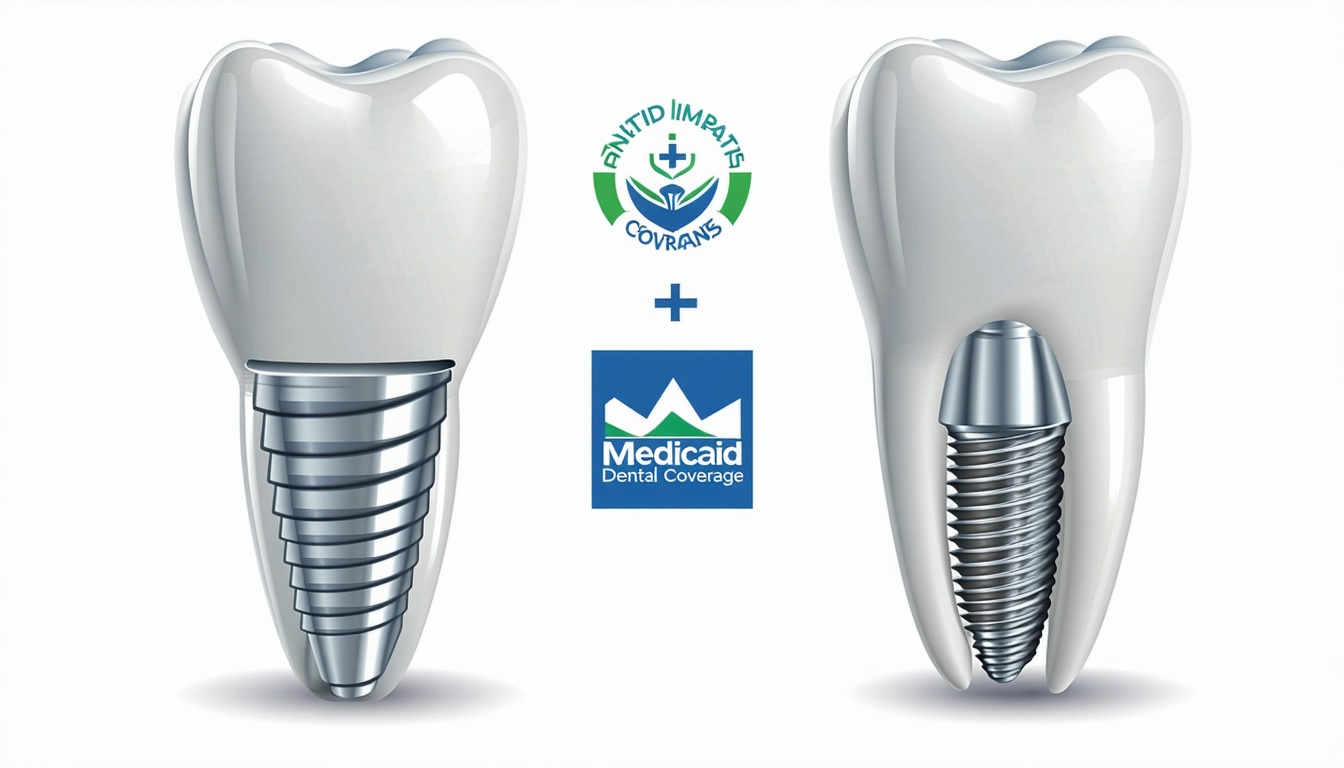
If you are exploring a tooth implant with Medicaid dental, you may have questions about what procedures are covered, how long you must wait before major services become eligible, and what alternatives can help you manage out-of-pocket costs. Whether you’re a professional in Charlotte, NC seeking a durable restoration, a senior replacing missing teeth, or someone considering convenient same-day crowns, understanding your Medicaid dental benefits is key to planning an affordable, long-term solution.
Below, we break down how Medicaid handles dental implants and same-day crowns, explain waiting periods and medical necessity criteria, show you financing and alternative insurance options, and guide you to qualified providers in your area.
Unlike children, adults on Medicaid often face limited dental coverage that varies by state. In North Carolina, basic preventive care—cleanings, exams, X-rays—typically kicks in as soon as you enroll. However, coverage for restorative procedures such as implants and crowns is optional and may require proof of medical necessity.
Across the country, each state decides which dental services to offer Medicaid enrollees. Coverage levels for adult dental care range from emergency-only to extensive plans with over 100 covered procedures. For example, states like Alaska, California, Colorado, and New York provide comprehensive benefits for adults, covering many preventive, diagnostic, and restorative services (GoodRx). In contrast, some states limit adult coverage to urgent treatments like extractions and pain relief.
A dental implant replaces a missing tooth with a titanium post anchored in your jawbone and topped with a custom crown. Implants offer durability, preserve bone health, and look and function like natural teeth. However, they typically cost between $3,100 and $5,800 per tooth—including the implant, abutment, crown, and surgical fees (Stride Health). That price tag can be a barrier if Medicaid does not cover the procedure.
Medicaid may approve implants when they are deemed medically necessary rather than purely cosmetic. Common criteria include:
To qualify for any dental coverage, you must be actively enrolled in Medicaid, meet your state’s income and residency requirements, and use an in-network provider. Some states require you to have been on your plan for a set period before major dental benefits (see “Managing waiting periods”). Once you fulfill these requirements and secure pre-approval, you can move forward with scheduling your implant procedure.
Many Medicaid dental plans impose waiting periods for basic and major services to discourage immediate high-cost claims. Typical waits are:
| Service type | Waiting period |
|---|---|
| Preventive care | None |
| Basic restorative | Up to 6 months |
| Major restorative | 6–12 months |
Major restorative services include implants, root canals, crowns, and dentures. Waiting periods ensure sustainability of the program but can be challenging if you need urgent care (Humana).
If severe pain or infection strikes during your waiting period, Medicaid may not cover the full implant procedure but often covers emergency extractions or drainages. You will likely pay out-of-pocket for implant placement and the final crown. To minimize costs, discuss emergency coverage explicitly with your dentist and your state Medicaid office before treatment begins.
If Medicaid falls short, you can supplement your coverage with private plans that include implant and crown benefits. Popular carriers and resources:
These plans often waive waiting periods for in-network providers and may cover 50–80 percent of the procedure cost after your deductible.
Many practices offer in-house financing or partner with third-party lenders to stretch implant costs over 6–24 months with low or zero interest. Key features to compare:
A dental discount plan is not insurance but can reduce implant and crown fees by 15–60 percent at participating providers. You pay an annual membership fee—often $100–$200—and then receive negotiated discounts on treatment fees, making implants more affordable.
Choosing a provider who accepts Medicaid and performs implants is crucial. Search your state’s Medicaid directory or use our guide to locate a medicaid approved implant dentist near Charlotte. Confirm that the practice:
Staying in-network maximizes your benefits and minimizes surprises. An out-of-network dentist may charge higher fees and require you to pay the difference. Always verify network status before booking your consultation.
Proactive communication speeds approval and avoids denials. Steps to take:
Same-day crowns, often made with CEREC or similar systems, allow you to receive a custom ceramic crown in a single visit. Benefits include reduced chair time, no temporary crown, and immediate restoration of function and aesthetics.
Medicaid’s stance on same-day crowns parallels its general crown policy—if crowns are covered, same-day crowns are included as a type of major restorative service. You will likely face a waiting period and need medical necessity justification if you require a crown due to trauma or pre-existing restorative failure.
To minimize costs, choose a same-day crown provider in your network. Options to explore include:
While these references focus on private plans, the process for Medicaid is similar—confirm network status and waiting periods before scheduling.
Once you have approval, work with your dentist to schedule implant placement or crown milling at a time that suits your calendar. Ask about sedation options, post-op care, and expected recovery timeline.
Maintain a file that includes:
Having these documents on hand simplifies billing and prevents misunderstandings about your financial responsibility.
Overall, navigating a tooth implant with Medicaid dental requires patience, persistence, and informed planning. If you encounter coverage gaps, consider:
By understanding your benefits, managing waiting periods, and leveraging alternative financing, you can achieve a functional, aesthetically pleasing result without undue financial strain. To get started, schedule a consultation with a medicaid approved implant dentist who can guide you through every step toward a confident, long-lasting smile.


